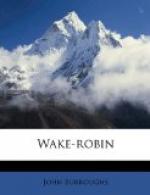A friend of mine, now an old man, who spent his youth in the woods of northern Ohio, and who has written many books, says, “I never thought of writing a book, till my self-exile, and then only to reproduce my old-time life to myself.” The writing probably cured or alleviated a sort of homesickness. Such is a great measure has been my own case. My first book, “Wake-Robin,” was written while I was a government clerk in Washington. It enabled me to live over again the days I had passed with the birds and in the scenes of my youth. I wrote the book sitting at a desk in front of an iron wall. I was the keeper of a vault in which many millions of bank-notes were stored. During my long periods of leisure I took refuge in my pen. How my mind reacted from the iron wall in front of me, and sought solace in memories of the birds and of summer fields and woods! Most of the chapters of “Winter Sunshine” were written at the same desk. The sunshine there referred to is of a richer quality than is found in New York or New England.
Since I left Washington in 1873, instead of an iron wall in front of my desk, I have had a large window that overlooks the Hudson and the wooded heights beyond, and I have exchanged the vault for a vineyard. Probably my mind reacted more vigorously from the former than it does from the latter. The vineyard winds its tendrils around me and detains me, and its loaded trellises are more pleasing to me than the closets of greenbacks.
The only time there is a suggestion of an iron wall in front of me is in winter, when ice and snow have blotted out the landscape, and I find that it is in this season that my mind dwells most fondly upon my favorite themes. Winter drives a man back upon himself, and tests his powers of self-entertainment.
Do such books as mine give a wrong impression of Nature, and lead readers to expect more from a walk or a camp in the woods than they usually get? I have a few times had occasion to think so. I am not always aware myself how much pleasure I have had in a walk till I try to share it with my reader. The heat of composition brings out the color and the flavor. We must not forget the illusions of all art. If my reader thinks he does not get from Nature what I get from her, let me remind him that he can hardly know what he has got till he defines it to himself as I do, and throws about it the witchery of words. Literature does not grow wild in the woods. Every artist does something more than copy Nature; more comes out in his account than goes into the original experience.
Most persons think the bee gets honey from the flowers, but she does not: honey is a product of the bee; it is the nectar of the flowers with the bee added. What the bee gets from the flower is sweet water: this she puts through a process of her own and imparts to it her own quality; she reduces the water and adds to it a minute drop of formic acid. It is this drop of herself that gives the delicious sting to her sweet. The bee is therefore the type of the true poet, the true artist. Her product always reflects her environment, and it reflects something her environment knows not of. We taste the clover, the thyme, the linden, the sumac, and we also taste something that has its source in none of these flowers.




